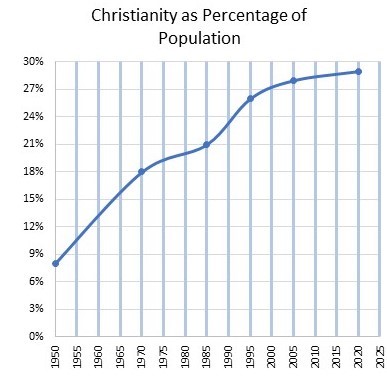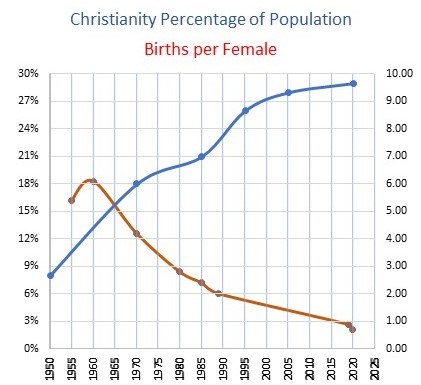South Korea’s population slide is even more tragic than immediately apparent. This disturbing trajectory developed during a massive push to evangelize and spread the gospel! Korea’s anti-maternal, anti-familial and pro-death culture grew during a great evangelistic and church-planting movement.
 As every “world Christian” knows, South Korea has been a model of church growth and missionary fervor. This started about 1945, when the Japanese surrendered, ending their occupation of the Korean peninsula. Approximately two percent of Koreans were Christians. Christian missionaries arrived, evangelism and church planting began, and a dynamic Christian church was launched. By 2010, at least thirty percent of Korea’s fifty million people professed Christ. “Official government statistics put the number of Protestant churches at 77,000 as of 2012, more than three times the number of convenience stores in the country. This translates to a 1-to-660 ratio of churches to Koreans.” Flying into Seoul at night, one is stunned by a skyline of red neon crosses.
As every “world Christian” knows, South Korea has been a model of church growth and missionary fervor. This started about 1945, when the Japanese surrendered, ending their occupation of the Korean peninsula. Approximately two percent of Koreans were Christians. Christian missionaries arrived, evangelism and church planting began, and a dynamic Christian church was launched. By 2010, at least thirty percent of Korea’s fifty million people professed Christ. “Official government statistics put the number of Protestant churches at 77,000 as of 2012, more than three times the number of convenience stores in the country. This translates to a 1-to-660 ratio of churches to Koreans.” Flying into Seoul at night, one is stunned by a skyline of red neon crosses.
During this time of astronomical church growth Korea was transformed from an impoverished, starving rural nation to the fourth largest economy in Asia and the twelfth in the world!
Korea is to be saluted for her church growth and economic advance. But while all this was happening, the culture was slowly shifting to a post-maternal, post-familial, pro-death society. Korea’s birthrates plunged; her suicide rates soared. In short, Korea began a self-imposed downward death spiral, the path of cultural and national suicide.
The Korean government has tried to solve this problem with money, paying cash stipends and extending family tax breaks to women who have babies. They offered maternity leave and paid daycare. These economic solutions have largely failed. Why? Because money isn’t the solution.
The church has freedom and capacity
It’s not as if the church lacked capacity, either. Or opportunity. In addition to its remarkable growth, the Korean church has enjoyed freedom to shape herself and build programs to meet the needs of her members and of the larger Korean community. As noted by a 2012 Pew Research article, “religious restrictions in South Korea are lower than in the U.S., and significantly lower than the median level of religious restrictions in the Asia-Pacific region.”
The Korean church has had the ability, influence and wealth to shape a nation with the culture of the kingdom of God: Truth, Beauty, and Goodness. Alas, this has not transpired. In fact, during these decades, church growth and population growth have been in reverse proportion. South Korea is dying because of the Sacred-Secular divide.
 Many evangelicals regard as sacred, and therefore of ultimate importance, a relatively small slice of life: evangelism, church planting, Bible distribution, worship services, missionary work, etc. Everything else—education, government, citizenship, family formation, vocation, the arts (obviously the list goes on and on)—is relegated to second place. Somebody needs to care for such matters, and it would be good if Christians were involved, but these concerns certainly don’t rise to the level of first importance.
Many evangelicals regard as sacred, and therefore of ultimate importance, a relatively small slice of life: evangelism, church planting, Bible distribution, worship services, missionary work, etc. Everything else—education, government, citizenship, family formation, vocation, the arts (obviously the list goes on and on)—is relegated to second place. Somebody needs to care for such matters, and it would be good if Christians were involved, but these concerns certainly don’t rise to the level of first importance.
To this way of thinking, South Korea presents a severe rebuke. Shaped by the Sacred-Secular Divide, this wonderful Asian nation may be thriving in the pew but she is languishing in the public square. Maybe in the throes of death.
Where is the church?
South Korea is a powerful illustration of what happens when the evangelical church splits the physical and the spiritual, what we often call the Sacred-Secular Divide.
This is a wake up call to the church. It is not enough to do evangelism and church planting. These must be accompanied by discipleship in what is called the spiritual disciplines: prayer, studying the Bible, fellowship/corporate worship, and sharing one’s faith. Such growth is fundamental to the Christian life. But, as with evangelism and church growth, individual disciple making is insufficient to fulfilling the great commission. Jesus sent us to disciple the nations.
The church In Korea and elsewhere has not discipled the nation at the level of culture. We have operated, not from a comprehensive Judeo-Christian worldview, but from an anemic Greek worldview – the Sacred Secular Divide. We have failed to tell the whole biblical narrative, beginning in Genesis 1, have failed to call the church to function from the biblical worldview.
The Korean church has been secularized. Not only did the church fail to disciple the nation, they failed to disciple the church at the most basic level of the Cultural Commission: “Be fruitful and multiply and fill the earth.” Instead of the church discipling the nation, with a life-affirming, family-forming, hopeful future, the nation was discipling the church with its secularistic, narcissistic, consumer-oriented, disaffiliated, child-free culture without hope for a personal or national future. Instead of the church modeling the glory of the maternal and the formation of the family, they accepted the secular vision of post-maternal and post-familial culture as the new norm.
Religion and fertility correlate
Researchers Sam Hyun Yoo and Victor Agadjanian, in their paper “Did Christian Women Lead Fertility Decline in South Korea?” demonstrate the correlation between religion and fertility. They point out that global Christianity has often been associated with higher levels of fertility because the church has often resisted artificial birth control. This tradition existed in the church in Korea for a while. But higher fertility rates in Korea and neighboring China, coupled with the fear of “overpopulation,” led Korean and Chinese governments to focus on the “ideal” family, one or two children.
The following graphic summarizes the Yoo and Agadjanian article.
|
Year |
Secular |
Buddhist |
Protestant |
Catholic |
Other |
Total |
|
1985 |
2.47 |
2.71 |
2.27 |
2.14 |
3.16 |
2.50 |
|
2005 |
1.30 |
1.43 |
1.39 |
1.36 |
1.45 |
1.35 |
Despite the immense importance Christianity places on family formation, on the celebration of children and the maternal nature of women, Christians have led the decline in low fertility rates in Korea. In fact they dropped below the Replacement Fertility Rate before other groups and appear to be leading the race to the bottom.
We have celebrated the Korean legacy of evangelism, church growth and the sending of missionaries. Yet, in the long run, what’s to celebrate if the church has forgotten the most basic task of discipling the nation to fulfill the Cultural Mandate?
Post-maternal culture
A po st-Christian climate is leading us to a post-human world. This includes, with the rise of evolutionary ideology, a post-moral world. The rise of radical feminism has led to a post-maternal world. As modernism begins its slow demise, postmodernism has given rise to a post-truth culture and the gender identity movement.
st-Christian climate is leading us to a post-human world. This includes, with the rise of evolutionary ideology, a post-moral world. The rise of radical feminism has led to a post-maternal world. As modernism begins its slow demise, postmodernism has given rise to a post-truth culture and the gender identity movement.
The post-maternal culture will have a profound effect at the micro level of individual women, and a profound effect at the macro level of national and cultural survival as well. The 1960s “Population Bomb” myth is being exploded. Social scientists are now speaking about a Demographic Winter and The Empty Planet.
The fundamental need is a narrative that supports the formation of families, the dignity of the maternal and of all human life, and the hope of a future. We get that from the scriptures, beginning in Genesis 1.
The suicide of Korea should be a reminder to redouble the effort to expose the cause of this national madness and with a loud voice to promote the biblical mandate to form families, to have children, the only means of stopping this self-imposed downward spiral.
- Darrow Miller







2 Comments
José Muñoz
March 24, 2020 - 10:19 amUna hermosa reflexión, muy profunda, cuan importante es el rol de la iglesia en la sociedad, no puede caer en diferenciar sagrado de lo secular; tenemos que cambiar nuestra manera de ver las cosas, sino seguiremos con una cosmovisión que en nada parece Bíblica, con una mente dividida, tendremos una dicótoma de pensamiento.
admin
March 25, 2020 - 8:53 amJose, thank you for your thought on the blog on church growth and a nations suicide. Yes, we must celebrate the results of our evangelistic and church planting efforts. But if that is all we do, we will see more and more countries moving down the slope of national suicide. We must begin to realize that the goal is not merely saved souls, it is disciple nations.
Below is a translation of Jose’s correspondence.
A beautiful reflection, very deep, how important is the role of the church in society, cannot fail to differentiate sacred from secular; We have to change our way of seeing things, otherwise we will continue with a worldview that in no way seems Biblical, with a divided mind, we will have a dichotomy of thought.